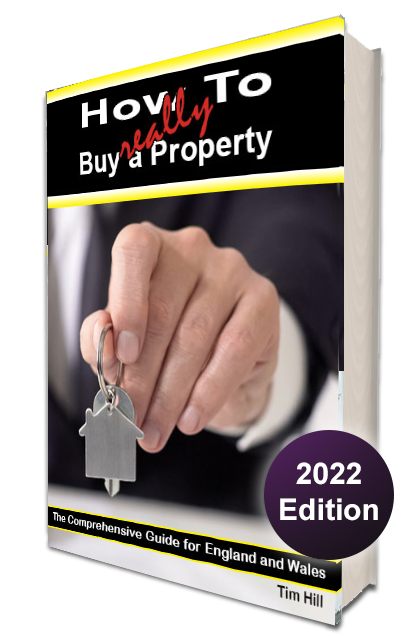Chapter 21: Legal Matters in Property Purchases
This is an extract from the ebook How to Really Buy a Property.
What's covered in this chapter
- Who your solicitor is working for;
- What your solicitor needs to find out - in plain English;
- Why old fashioned solicitors can add weeks to the buying process;
- Why solicitors fight with each other and delay the purchase;
- How to get documents faster than your solicitor can;
- What to consider when organising property insurance;
- How the drains could cost you a fortune;
- When to take a view and when to take a stand;
- How to stop small details delaying the purchase;
- How to exchange within hours of agreeing a sale price;
In Chapter 12 (Choosing a Conveyancer or Solicitor) we covered how to choose a good solicitor that will take your agreed offer through to a quick and timely exchange so that everyone is locked into the deal.
In Chapter 17 (The Property Buying Process in Theory) we then went over how things should work and the myriad of problems that can arise.
Chapter 20 (What a Property Survey Really Means) explained one of the major pitfalls in a purchase and how to work your way through it, sorting out what is serious and what is simply hot air.
This chapter looks at the essence of what is, and isn't, important outside of the survey and the options you have but are not always offered.
Your finance company who will provide the mortgage basically asks the question: "Are you, the buyer, a good bet to lend to and is the property you have offered on a good bet to secure that loan on should you ever default".
The solicitor also has a set of questions they want answered but they are legally obliged to inform the lender if they seriously believe anything they discover is likely to affect the lenders decision about either you or the property. The solicitor, for example, may discover that planning permission has just been granted to open a nightclub opposite your flat with live music until 3am every morning. The lender really ought to know that even if you think it is great news!
What the solicitor really needs to ascertain for the lender is laid out by the Council of Mortgage Lender and you can see the list of questions that relate to your lender on the internet.
In summary what your solicitor needs to find out falls into two parts:
- What he must find out because the lender says he should before they will give you the loan or mortgage on the property
- What he thinks he should find out on your behalf
In all conversations with your solicitor you should try and ascertain which of the above two any query he has relates to. Solicitors often try to sound technical by saying they have to do something "because it is in the CML hand book". What they are saying is the query must be answered because the lender requires it. All other queries are then up to you. If you don't feel a particular enquiry in the latter category is that important then tell your solicitor you are prepared to take a view on it and drop the query in order to save time.
What the Solicitor Needs to Find Out
The questions your solicitor is really looking to find answers for, and to make sure he does not get sued, are as follows:
| What it's called | What it means | |
| The Title Deeds | Does the person who is selling the property actually have the right to sell it - do they own it? | |
| Fixtures and Fittings | Apart from the bricks, mortar, roof and windows, what is the vendor proposing to include with the sale? | |
| The Sellers Pack | Does the vendor know of any reason why a buyer would not want the property? | |
| Insurance | Is the building insured and if not, why not? | |
| Planning Consent and Building Regulations Approval | If any changes were made to the building in the past was the appropriate consent gained and were the changes made to a good standard? | |
| The Local Searches | Is anything being planned for the area that would affect the value of the property and does your property have the right to be connected to the mains drainage system? | |
| Further Enquires | Are there any works planned for the property? | |
| Management Agent Enquiries | If it is a leasehold property are the service charges and ground rents of the level you were lead to believe by the agent and have they all been paid by the current owner? |
That really is about it and that is why it is possible to wrap up the legal side of things in a day if the solicitors put their minds to it - and some do. Most of the time delay in a transaction actually comes from them writing letters to each other which often go something like this:
- Solicitor A is concerned about why the service charge was so high two years ago
- Solicitor A asks his PA to write a letter to this affect
- Next day Solicitor A's PA writes the letter and sends it
- Two days later Solicitor B gets the letter but he is off that day
- The next day Solicitor B looks at the letter and believes the question has already been answered in the lease which was sent at the beginning
- Solicitor B asks his PA to write a letter saying to Solicitor A to look in the lease at section 3.2.c
- Next day Solicitor B's PA writes the letter and sends it
- Two days later the letter arrives with Solicitor A
- Solicitor A has read the lease and does not think it does answer the question so asks his PA to write another letter specifying why the section 3.2.c does not, in his view, answer the question.
- Solicitor A tells his client that Solicitor B is being awkward and avoiding questions so causing unnecessary delay.
- Solicitor B tells his client that Solicitor A is not reading the papers he has been sent and so is causing unnecessary delay
- The buyer and the vendor both think the other party is not serious about the transaction and consider withdrawing after two wasted weeks
In order to help you cut through the mess that is so easily generated, here are the questions that need to be answered and how, very often, you can get the answers much faster. If you want to understand the theory and terminology used in this text a little better make sure you have read Chapter 17: The Property Buying Process in Theory.
If the vendor has a mortgage on the property he does not actually own it as the mortgage lender has a loan secured on it. In this case his solicitor needs to ask the mortgage lender if it is alright to sell and, if it is, to send him the title deeds. The process of extracting the deeds from the lender can take anything from one to six weeks depending on whether the lender has lost them or not, and that happens quite a lot!
If the deeds are with the mortgage company there is also another set of deeds lodged with Land Registry themselves. These are known as Office Copy Entries as they are not technically the originals but almost all solicitors agree that they are good enough to be getting on with until the real ones arrive. Most modern solicitors acting for vendors request office copy entries immediately as a matter of course as they can be accessed in a matter of days.
Ask your solicitor or the selling agent to find out if the title deeds are with a lender. If they are request that the vendors solicitor obtains office copy entries so title can be checked straight away.
There are two parts of the title. Firstly to check that the person selling actually owns the property you want to buy and secondly, that he owns all of the property that you are trying to buy.
As an example you may be trying to buy a garden flat in an end of terrace house. Years previously the house next door may have had a pathway at the end of your garden leading to theirs so they could access their garden directly from the street.
At some point in the past the two neighbours sat down and agreed that the pathway was never used so it could become part of the garden that you are trying to buy. A handshake, a sledgehammer and some shrubs were all it took to seal the deal but neither party actually got it rubber stamped by a solicitor. The neighbours may be happy with the arrangement but it could mean that at any time in the future a new owner next door could turn round and demand his pathway back. Suddenly you have lost four feet of your garden and started worrying about security. In this case the vendor does have title to sell the property, just not all of it!
This issue can be resolved with either a deed of variation (the neighbour agrees to do the deal legally with solicitors) or indemnity insurance, which will be covered later.
On one final and small point title deeds are not the be all and end all of who has the right to sell the property. A person may have taken out a mortgage and bought the property by themselves. If a partner moved in for any period of time and can show that they contributed to the costs of the property (be it food, an electricity bill, or part of the mortgage) they will also have to give permission for the vendor to sell - even if they have since split up. This is a small and often painfully discovered fact but unfortunately this is very hard to find out and considering it happens in such a small amount of cases it is just one of those uncontrollable risks.
Every property on the road had, however, taken this pathway and included it in their garden. There was still an outside chance that the council could try and reclaim all the land and reopen the pathway but it would be an extremely unpopular act and so very unlikely.
Considering the size of the garden it was a very small amount at risk but Lisa was adamant that the current owners should secure the land from the council. The market was rising quickly at the time, weeks had past and the vendors knew that they could sell their property for more than Lisa had offered. This was exactly what they did and Lisa ended up buying a one bedroom flat with a smaller garden in the same area for the same price.
Apart from the Bricks, Mortar, Roof and Windows, What is the Vendor Proposing to Include With the Sale?
In theory all you are buying is bricks, mortar, a roof, some windows and a couple of doors. No one has actually said you will get the door handles, lights, carpet, curtains, kitchen cabinets, or even the plug sockets.
Your solicitor will ask for a fixtures and fittings form which details what is included and usually include a reference to the Estate Agents particulars. Something along the lines of "Is everything stated on the Estate Agents particulars (details) included in the sale?".
Most reasonable vendors will include anything that would otherwise need to be unbolted or that has been made for the property but watch out for requests demanding money for the strangest of things! In most cases these are made by vendors who have never sold before. They put something down because it appears on the fixtures and fittings list provided by their solicitor and would not have thought about it otherwise.
In reality hardly anyone ever takes the carpet with them so if push comes to shove, say you don't want it and see if they really will make the effort to pull it all up!
Much of this, it should be remembered, can be defined much earlier during the offer stage. See the chapter How to Really Make an Offer on a Property
Does the Vendor Know of Any Reason Why a Buyer Would Not Want the Property?
This is a fairly new question designed to stop unscrupulous vendors selling because a drummer had just moved in downstairs and they couldn't be bothered to resolve the noise problem. It is also there to make sure if some dispute is ongoing you are aware of it because it may become your dispute.
As an example your back garden may have a very nice apple tree in the middle which was a major reason for you offering. For all you know the neighbour is going to court to obtain a removal order because it is blocking his light, overhanging his garden and the roots are causing damage to his property. The last thing you want is to move in the day the order is granted and watch the council cut down the biggest feature of your dream home.
and all the others, when you
purchase the ebook How to Really Buy a Property



